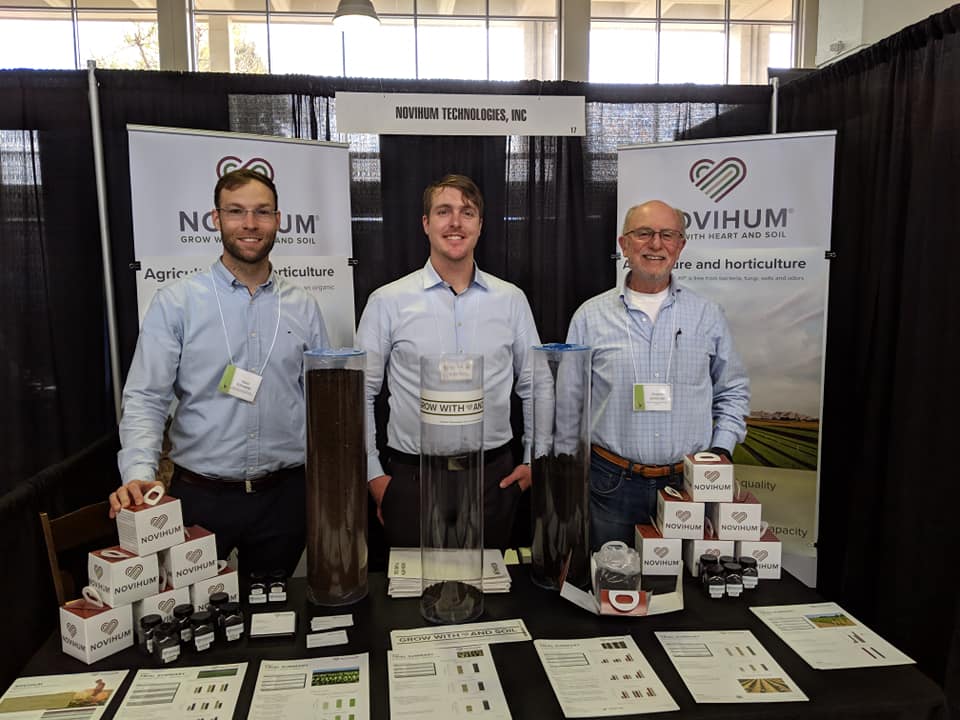By Tim Linden
It’s a simple catch phrase but Novihum Technologies claims that its signature product—a soil enhancer—lives up to the company’s motto, “We make soil better.”
In the late 1990s and early 2000s, researchers at the Dresden University of Technology in Germany invented a soil enhancer based on modified lignite, a combustible, sedimentary rock. Some of those researchers founded Novihum Technologies in 2012 to find a way to bring the revolutionary product to market. Current CEO Andre Moreira, who was with BASF Venture Capital for 13 years, joined Novihum in 2017 to guide the marketing effort.
Over the past decade, the company has proven that they can make the technology scalable in an economically efficient way and are now taking it to market, with the United States in general being one of their major markets and California being a key target because of its concentration of specialty crops. In 2016, Moreira said a pilot plant was built in Dortmund, Germany, which can annually produce 1,000-1,400 tons of Novihum, which is the name of the product and the company. The CEO referred to this quantity as only a “drop in the ocean” and noted that the company is in the process of expanding operations, which would include a manufacturing facility in the United States.
Novihum joined the Western Growers Center for Innovation and Technology in 2018 and is using its Salinas space as its titular U.S. headquarters. Erin McAbee, the company’s technical sales manager, is the California contact for interested U.S. growers. She described Novihum the product as “granular humic.” She explained that many growers use compost on their land, which breaks down the soil and creates a stable organic matter. Novihum, she said, is already at that stage. The company’s website claims “it is chemically indistinguishable from natural stable humus found in the best soil with a guaranteed humic content (humines, humic acids and fulvic acids) of 60% or higher.”
McAbee said Novihum has all the benefits of compost with none of the negatives, such as pathogens and micro-plastics. And she said a huge benefit is that it is 100% consistent with each handful being exactly the same.
The various iterations of the core product—Novihum 25, Novihum Fine, Novihum Dispersa, Novihum Argil and Novihum Argil Extra—are designed for differents soil types and application methods but each contains the same base material.
Moreira said growers have a healthy skepticism of these types of materials and rightly so, but he said Novihum understands that approach and meets it face on with data. Quoting a business axiom, he noted: “In God we trust, everyone else bring data.”
He said many peer reviewed papers on the product have been published by university researchers and the company has many trials to back up its claim that the application of Novihum products will improve the soil and increase yields. But he is quick to note that every situation, crop and grower is different. McAbee said the data also shows that improving the soil with Novihum also improves water use efficiency and retention.
In California, among the ground on which successful trials have been run are lettuce fields, grape vineyards and citrus orchards. They have also done work in the Midwest on field crops and have positive results on the soil enhancer’s use on many crops in Europe. Moreira said while the company is already open for full orders, which are shipped by container from Europe, he said production will ramp up significantly over the next five years. The Novihum representatives said the product is priced competitively with the current overseas shipping costs absorbed as a marketing cost by the company. Today’s price in the U.S. is similar to what growers will be paying once the product is manufactured here.
McAbee said a full application of Novihum, such as 1500 pounds per acre, continually improves the soil without need for an annual application. However, many growers lease land and are more inclined to pay costs associated with shorter term improvements rather than a longer lasting—and more expensive—application. That is why the company has several different products, including those in a concentration that does call for an annual application.
One strong believer in the product is WG member Alan Boyce, who is executive chairman of Materra Farming Company, Bakersfield, CA. “We field trialed it several years ago in the desert and noticed the plants were much healthier.”
Consequently, the farming operation utilized Novihum on a new planting of lemons in Imperial County. “Right now, the trees are 36 months old and they look like they have been in the ground five years,” Boyce said.
He noted the soil in Imperial is very sandy without a lot of organic matter. The use of Novihum has improved the soil immensely. Boyce is proud of his cutting-edge farming philosophy and of being open to being the first farmer to try something. “We tried robotic spraying on a large pistachio planting, and it worked great. My farm team said we have a perfect score. So, I told them that means we aren’t trying enough new things. We are early adopters.”
He noted that when planting permanent trees, the company is very much an advocate of using soil amendments and other strategies that can speed up growth on the front end. “With permanent crops you can go broke waiting to be rich. If we can cut off 18 months on the front end (between planting and first harvest) that’s golden.”
He said Novihum is doing a great job on the lemons. He believes the trees have absorbed less salt and are less brittle than others in the area and have stronger growth. He is a believer. “We’re preparing ground right now for a date planting and we are going to use Novihum,” he said.




